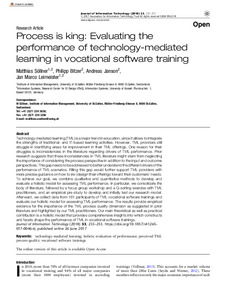Datum
2018-09-01Schlagwort
004 Informatik 370 Erziehung, Schul- und Bildungswesen Computerunterstütztes LernenE-LearningLeistungsbewertungQualitätssteigerungMetadata
Zur Langanzeige
Aufsatz

Process is King: Evaluating the Performance of Technology-mediated Learning in Vocational Software Training
Zusammenfassung
Technology-mediated learning (TML) is a major trend in education, since it allows to integrate the strengths of traditional- and IT-based learning activities. However, TML providers still struggle in identifying areas for improvement in their TML offerings. One reason for their struggles is inconsistencies in the literature regarding drivers of TML performance. Prior research suggests that these inconsistencies in TML literature might stem from neglecting the importance of considering the process perspective in addition to the input and outcome perspectives. This gap needs to be addressed to better understand the different drivers of the performance of TML scenarios. Filling this gap would further support TML providers with more precise guidance on how to (re-)design their offerings toward their customers’ needs. To achieve our goal, we combine qualitative and quantitative methods to develop and evaluate a holistic model for assessing TML performance. In particular, we consolidate the body of literature, followed by a focus group workshop and a Q-sorting exercise with TML practitioners, and an empirical pre-study to develop and initially test our research model. Afterward, we collect data from 161 participants of TML vocational software trainings and evaluate our holistic model for assessing TML performance. The results provide empirical evidence for the importance of the TML process quality dimension as suggested in prior literature and highlighted by our TML practitioners. Our main theoretical as well as practical contribution is a holistic model that provides comprehensive insights into which constructs and facets shape the performance of TML in vocational software trainings.
Zitierform
In: Journal of Information Technology (JIT) Volume 33 / Issue 3 (2018-09-01) , S. 233-253 ; EISSN 1466-4437Zitieren
@article{doi:10.17170/kobra-202010231998,
author={Söllner, Matthias and Bitzer, Philipp and Janson, Andreas and Leimeister, Jan Marco},
title={Process is King: Evaluating the Performance of Technology-mediated Learning in Vocational Software Training},
journal={Journal of Information Technology (JIT)},
year={2018}
}
0500 Oax
0501 Text $btxt$2rdacontent
0502 Computermedien $bc$2rdacarrier
1100 2018$n2018
1500 1/eng
2050 ##0##http://hdl.handle.net/123456789/11908
3000 Söllner, Matthias
3010 Bitzer, Philipp
3010 Janson, Andreas
3010 Leimeister, Jan Marco
4000 Process is King: Evaluating the Performance of Technology-mediated Learning in Vocational Software Training / Söllner, Matthias
4030
4060 Online-Ressource
4085 ##0##=u http://nbn-resolving.de/http://hdl.handle.net/123456789/11908=x R
4204 \$dAufsatz
4170
5550 {{Computerunterstütztes Lernen}}
5550 {{E-Learning}}
5550 {{Leistungsbewertung}}
5550 {{Qualitätssteigerung}}
7136 ##0##http://hdl.handle.net/123456789/11908
<resource xsi:schemaLocation="http://datacite.org/schema/kernel-2.2 http://schema.datacite.org/meta/kernel-2.2/metadata.xsd"> 2020-10-29T18:11:29Z 2020-10-29T18:11:29Z 2018-09-01 doi:10.17170/kobra-202010231998 http://hdl.handle.net/123456789/11908 eng Namensnennung 4.0 International http://creativecommons.org/licenses/by/4.0/ technology-mediated learning holistic evaluation of performance perceived TML process quality vocational software trainings 004 370 Process is King: Evaluating the Performance of Technology-mediated Learning in Vocational Software Training Aufsatz Technology-mediated learning (TML) is a major trend in education, since it allows to integrate the strengths of traditional- and IT-based learning activities. However, TML providers still struggle in identifying areas for improvement in their TML offerings. One reason for their struggles is inconsistencies in the literature regarding drivers of TML performance. Prior research suggests that these inconsistencies in TML literature might stem from neglecting the importance of considering the process perspective in addition to the input and outcome perspectives. This gap needs to be addressed to better understand the different drivers of the performance of TML scenarios. Filling this gap would further support TML providers with more precise guidance on how to (re-)design their offerings toward their customers’ needs. To achieve our goal, we combine qualitative and quantitative methods to develop and evaluate a holistic model for assessing TML performance. In particular, we consolidate the body of literature, followed by a focus group workshop and a Q-sorting exercise with TML practitioners, and an empirical pre-study to develop and initially test our research model. Afterward, we collect data from 161 participants of TML vocational software trainings and evaluate our holistic model for assessing TML performance. The results provide empirical evidence for the importance of the TML process quality dimension as suggested in prior literature and highlighted by our TML practitioners. Our main theoretical as well as practical contribution is a holistic model that provides comprehensive insights into which constructs and facets shape the performance of TML in vocational software trainings. open access Söllner, Matthias Bitzer, Philipp Janson, Andreas Leimeister, Jan Marco doi:10.1057/s41265-017-0046-6 Computerunterstütztes Lernen E-Learning Leistungsbewertung Qualitätssteigerung publishedVersion EISSN 1466-4437 Issue 3 Journal of Information Technology (JIT) 233-253 Volume 33 false </resource>
Die folgenden Lizenzbestimmungen sind mit dieser Ressource verbunden:


